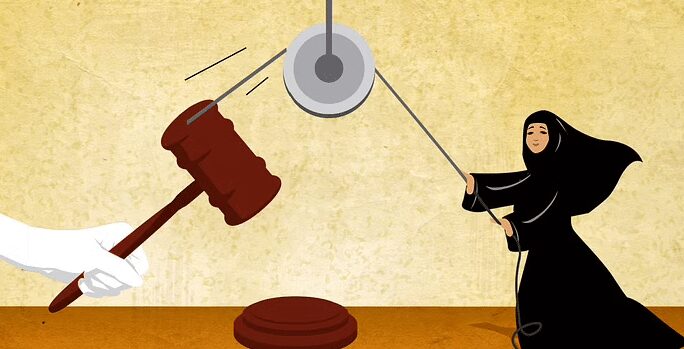Apex Court has sought a response from the Centre on a plea to declare all extra-judicial and unilateral talaq including Talaq-e-Kinaya and Talaq-e-Bain as unconstitutional.
Call and Contentions Made

A plea filed by Dr. Syeda Ambreen of Karnataka’s Kalaburgi argued that practices of Talaq-e-Kinaya and Talaq-e-Bain are irrational, arbitrary, tyrannical, and are in contradiction with fundamental rights namely Articles 14, 15, 21, and 25, thus contending that these should be turned unconstitutional. She also asked the court to declare the Dissolution of Muslim Marriages Act, 1939, void and unconstitutional for being violative of Articles 14, 15, 21, and 25 of the Constitution in as it fails to secure Muslim women from such unilateral and extra-judicial divorces. Petitioner claimed that she was arbitrarily given Talaq-e-Kinaya for the reason of giving a lesser dowry than asked and was mentally tortured by her husband and his family members.
The petition contended that the extra-judicial and unilateral divorces are an ‘evil plague similar to sati’ which continues to create fracas and disturbance in the life of Muslim women and results in serious health, economic, social, moral, and emotional risks in their lives. This case with other priorly reported cases highlights the grievances that married Muslim women are suffering at the hands of Muslim patriarchal society, even after Talaq-e-Hasan being as termed unconstitutional. It was perceived that the abolition of the practice of Talaq-e-Hasan would ameliorate the situation of married Muslim women by shielding them from tyrannical and inopportune divorces, but this perception has been turned wrong by a series of pleas being filed by Muslim women to term other unilateral and extra-judicial divorce practices as unconstitutional.
Extra Judicial Practices of Divorce and Islam
Triple talaq or Talaq-e-Bidder was one of the most controversial divorce practiced in Islam, in which the matrimonial bond between husband and wife was based on the mercy of the husband’s utterance of the word talaq thrice consecutively and when the husband speaks the same, instantly marriage turns invalid. This practice was termed unconstitutional in Shayara Bano v. Union of India & Others, to protect the rights of Muslim women and promote gender equality and gender justice to sub-serve fundamental rights of non-discrimination and empowerment.
This judgment did the justice but apparently as other arbitrary divorce practices are now agitating and agonizing lives of married Muslim women. Groundless practices of Talaq-e-Kinaya and Talaq-e-Bain are still present and practiced by men in Islam to arbitrarily turn marriage as void, in former there is a use of ambiguous or unclear words to declare the revocation of marriage whereas the latter is an instantaneous, irrevocable and unilateral practice to pronounce Talaq either in written or electronic form. Talaq-e-Hasan another extra-judicial practice is a practice in which men could seek divorce from their wives by pronouncing talaq once every month over a period of three-month.
Play of Patriarchy

If one reads between the lines of these practices of divorce, it could easily be concluded that the authority to pronounce divorce lies with men, and women just play the role of chattels, first transferred to the husband’s home from their own and then back to theirs if their family accepts them. Though Supreme Court observed in August 2022 that prima facie Talaq-e-Hasan is ‘not so improper’ by pointing out that Muslim women do have the option of Khula, by which women could also seek divorce by returning dower which they received from their husband or without returning the anything, as agreed between spouses or by Qadi’s court.
Innuendo Sighted
On the face, Khula does look like an option with women but digging deeper highlights its discrepancies and shortcomings, Khula literally means ‘to take off clothes’ and hence gives authority to men over their wife. The Subservient nature of Khula could clearly be signified in its practice wherein two conditions have to be validated by the wife to seek a divorce, the first being that there has to be consent, if there is mutual consent then the practice would be termed as Mubarat and if consent to the divorce is sole of the wife then that divorce would be termed as Khula, second is the consideration by the wife, which implies that, to seek divorce wife have to pay some consideration to the husband for the restitution of conjugal rights.
This practice of Khula clearly signifies it being a conditional divorce in which the wife gets the license to purchase back her freedom from her husband’s authority if she can fulfill pre-requisites. These practices of restitution of conjugal bonds by mere recitation of a word or words by the husband within a specified time, or by the wife paying for purchasing back her freedom articulately indicates the hegemonic and patriarchal nature of Islamic divorce’s rules and procedures wherein men could anytime and anywhere repudiate the matrimonial bond and women to do the same have to face multiple legal and financial hurdles.
Role of Centre in Way Forward

The plea submitted has sighted the need for unilateral extra-judicial Talaq practices to be turned void. As these divorce practices threaten the public order, morality, and health of Muslim women. These practices do not form integral or essentially religious to Islam. And are not under the ambit of Article 25 as this article purely protects religious faith and essential religious practices but not practices that result out to be against public order, mortality, or health. The move of the Supreme Court to seek a response from the Centre regarding these extra-judicial and unilateral divorce practices has now turned all the eyes on the Centre and its about to come acknowledgment on this issue.













